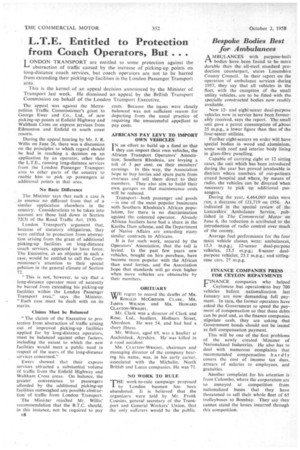L.T.E. Entitled to Protection from Coach Operators, But . .
Page 80

If you've noticed an error in this article please click here to report it so we can fix it.
LONDON TRANSPORT are entitled to some protection against the LONDON of traffic caused by the increase of picking-up points on long-distance coach services, but coach operators are not to be barred from extending their picking-up facilities in the London Passenger Transport aria_
This is the kernel of an appeal decision announced by the Minister of Transport last week. He dismissed an appeal by the British Transport Commission on behalf of the London Transport Executive.
The appeal was against the Metropolitan Traffic Commissioner's grant to George Ewer and Co., Ltd., of new picking-up points at Enfield Highway and Waltham Cross on express pervices from Edmonton and Enfield to south coast resorts.
During the appeal hearing by Mr. J. R. Willis on June 26, there was a discussion on the principles to which regard should be had in reaching a decision on an application by an operator, other than the L.T.E., running long-distance services from the London Passenger Transport area to other parts of the country to enable him to pick up passengers at additional points in that area.
No Basic Difference The Minister says that such a case is in essence no different from that of a similar application elsewhere in the country. Considerations to be taken into account are those laid down in Section 72(3) of the Road Traffic Act, 1930.
London Transport's argument that, because of statutory obligations, they were entitled to protection from abstraction arising from the grant of additional picking-up facilities on long-distance coach services, appeared to have force. The Executive, as an objector in such a case, would be entitled to call the Commissioner's attention to their special pAition in the general climate of Section 72.
"This is not, however, to say that a long-distance operator must of necessity be barred from extending his picking-up facilities within the London Passenger Transport area," says the Minister. "Each case must be dealt with on its merits.
Claims Must be Balanced " The claims of the Executive to protection from abstraction of traffic arising out of improved picking-up facilities applied for by long-distance operators, must be balanced against other factors, including the extent to which the new facilities would meet a public need in respect of the users of the long-distance services concerned."
Ewers showed that their express services attracted a substantial volume of traffic from the Enfield Highway and Waltham Cross areas. On balance, the greater convenience to passengers afforded by thc additional picking-up facilities outweighed any possible abstraction' of traffic from London Transport.
The Minister rejeCted Mr. Willis' recommendation that the B.T.C. should, in this instance, not be required to pay E8 costs. Because the issues were closely balanced was not sufficient reason for departing from the usual practice of requiring the unsuccessful appellant to pay costs.
AFRICANS PAY LEVY TO !WORT OWN VEHICLES IN an effort to build up a fund so that they can import their own vehicles, the African Transport Operators' Association, Southern Rhodesia, are levying a toll of 5 per cent, on their members' earnings. In this way, the Association hope to buy lorries and spare parts from overseas and sell them direct to their members. They also aim to build their own garages so that maintenance costs will be reduced_ Transport--both passenger and goods —is one of the most popular businesses with Southern Rhodesia's African population, for there is no discrimination against the coloured operator. Already African hauliers have had a share in the Kariba Dam scheme, and the Department of Native Affairs are awarding many similar contracts to Africans.
It is for such work, secured by the Operators' Association, that the toll is levied. In the past few years new vehicles, bought on hire purchase, have become more popular with the African than used lorries, and the Association hope that standards will go even higher when more vehicles are obtainable by their members.
OBITUARY WE regret to record the deaths of MR. RONAID MCGREGOR CLARK, MR. JAMES WILSON and MR. HOWARD CLAYTON-WRIGHT.
Mr. Clark was a director of Clark and Rose, Ltd., hauliers, Holborn Street, Aberdeen. He was 54, and had had a short illness.
Mr. Wilson, aged 69, was a haulier at Auchinleck, Ayrshire. He was killed in a road accident.
MR. CLAYTON-WRIGHT, chairman and managing director of the company bearing his name, was, in his early career, associated with the Michelin. North British and Lucas companies. He was 71.
NO WORK TO RULE
THE work-to-rule campaign proposed by London busmen has been abandoned. It is believed that the organizers were told by Mr. Frank Cousins, general secretary of the Transport and General Workers' Union, that the only sufferers would be the public_
















































































































































































